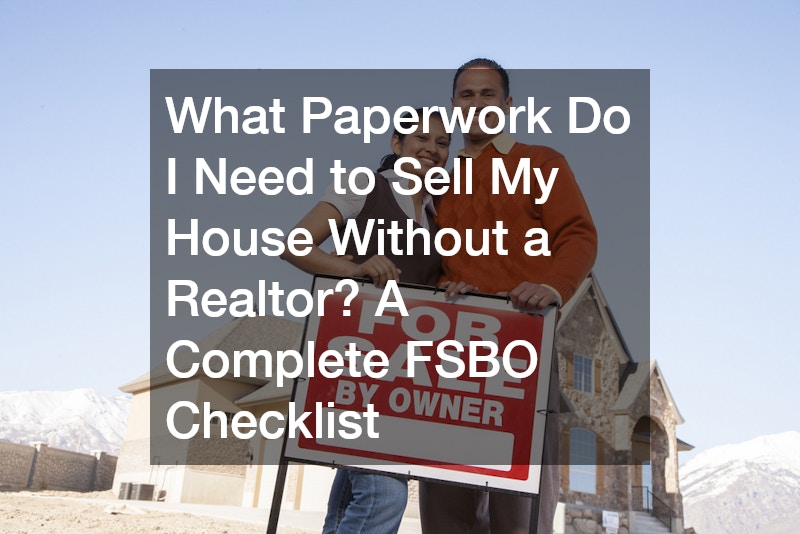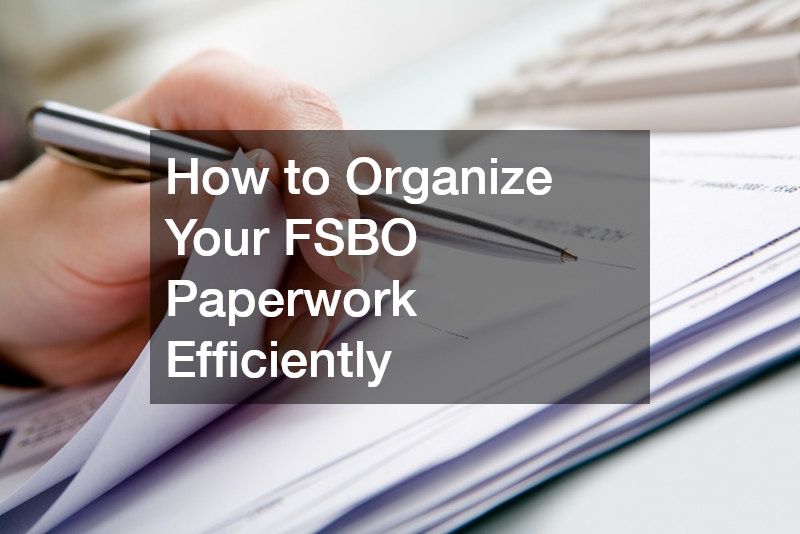Disclaimer: The financial content on this site is for informational purposes only and should not be considered financial or investment advice. Please consult a licensed financial advisor before making any financial decisions.
Selling your home without a realtor can save thousands in commission fees, but it comes with added responsibilities, especially when it comes to paperwork. From disclosures to legal contracts, there are several essential documents you’ll need to legally and successfully complete a real estate transaction.
If you’re asking, “What paperwork do I need to sell my house without a realtor?”, this guide provides a complete FSBO (For Sale By Owner) checklist for homeowners. We’ll walk you through each document you’ll need and explain its purpose so you can feel confident and compliant throughout the process.
Whether you’re experienced in real estate or handling your first sale, getting the paperwork right is key to a smooth transaction.
Do I Really Need All This Paperwork When Selling FSBO?
When selling your house without a realtor, you take on tasks typically handled by professionals, including preparing all required documentation. These papers protect both you and the buyer while ensuring the sale complies with state and federal laws.
Skipping or mishandling paperwork can lead to legal trouble, delayed closings, or the loss of a deal altogether. That’s why understanding what each document is—and why it’s necessary—can keep your FSBO process on track.
Here’s a breakdown of everything you’ll likely need.
1. Property Deed (Proof of Ownership)
This document proves you legally own the property and have the right to sell it. The buyer’s title company or attorney will need this to begin the transfer of ownership.
Make sure your name is spelled correctly and that the property description matches public records. If the deed has any errors, you’ll need to correct them before proceeding.
✔️ Tip: You can request a copy of your deed from your local county recorder’s office.
2. FSBO Sales Contract (Purchase Agreement)
This legally binding contract outlines the terms of the sale. It includes:
- Sale price
- Closing date
- Buyer and seller information
- Property address and legal description
- Contingencies (financing, inspection, appraisal)
- Earnest money details
Use a state-specific FSBO contract to avoid missing key legal language. Many states offer fillable templates, or you can hire a real estate attorney to draft one for you.
3. Mandatory Disclosure Forms
Nearly every state requires home sellers to disclose certain property conditions to buyers. These include:
- Lead-based paint disclosure (for homes built before 1978)
- Property condition disclosures (roof, plumbing, foundation, etc.)
- Pest or termite reports (in some regions)
- Hazard disclosures (e.g., flood zones, radon, mold)
Failing to disclose known issues can result in lawsuits or contract cancellation, so be transparent and thorough.
4. Comparative Market Analysis (CMA) or Home Appraisal
While not always required, these documents help justify your asking price.
- A CMA is typically provided by a realtor, but FSBO sellers can create one using recent sale prices of similar homes in the area.
- A professional appraisal provides a more official value and can give your listing credibility with buyers.
✔️ Tip: Consider attaching your CMA or appraisal report to your listing or sharing it with serious buyers.
5. Home Inspection Report (Optional but Recommended)
Though inspections are typically handled by the buyer, getting a pre-listing home inspection can help you:
- Identify and fix issues in advance
- Price the home more accurately
- Build trust with potential buyers
If you complete an inspection, share the full report and include receipts for any repairs made.
6. Title Report and Preliminary Title Search
Before closing, buyers will typically request a title search to ensure there are no liens, disputes, or claims against the property.
You can order a preliminary title report through a title company to speed up the closing process and resolve any title issues early on.
7. Buyer’s Pre-Approval Letter or Proof of Funds
While this is technically a buyer’s document, as the seller, you’ll want to request a mortgage pre-approval letter (for financed buyers) or proof of funds (for cash buyers).
This helps confirm the buyer is financially capable of completing the purchase, which protects you from unnecessary delays or failed deals.
8. Settlement Statement (Closing Disclosure)
This document outlines all financial details of the sale, including:
- Sale price
- Loan payoffs
- Closing costs
- Prorated taxes
- Title and escrow fees
Typically prepared by the title company or closing attorney, the settlement statement must be reviewed and signed by both parties before closing.
9. Bill of Sale (For Personal Property)
If you’re including personal items with the home (e.g., appliances, furniture), a bill of sale helps document the transfer of ownership for these items separately from the home sale.
It’s a simple but useful form that helps avoid confusion later on.
10. Identification and Utility Info
Lastly, be prepared to provide:
- Government-issued ID (required for notarization at closing)
- Final utility readings or service transfer documents
- HOA documents, if applicable
Though less formal, these items smooth out the transition for both parties.
How to Organize Your FSBO Paperwork Efficiently
To stay organized and avoid missing critical steps:
- Use a checklist of required forms for your state
- Keep digital and hard copies of everything
- Work with a real estate attorney or title company
- Stay ahead of deadlines for inspections, financing, and disclosures
If this seems overwhelming, remember that selling your house without a realtor doesn’t mean going it completely alone—attorneys, inspectors, and title agents can still provide valuable support.


